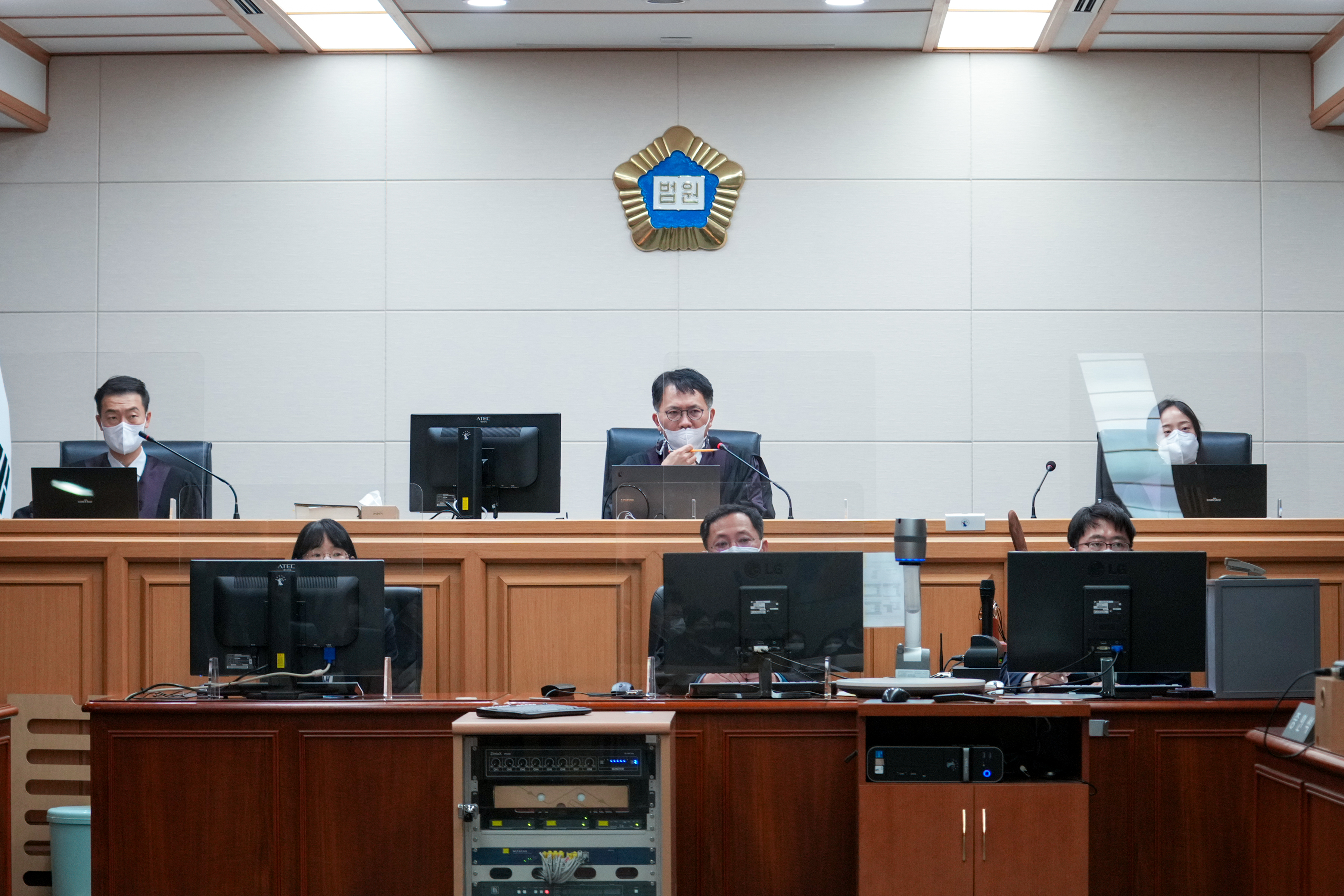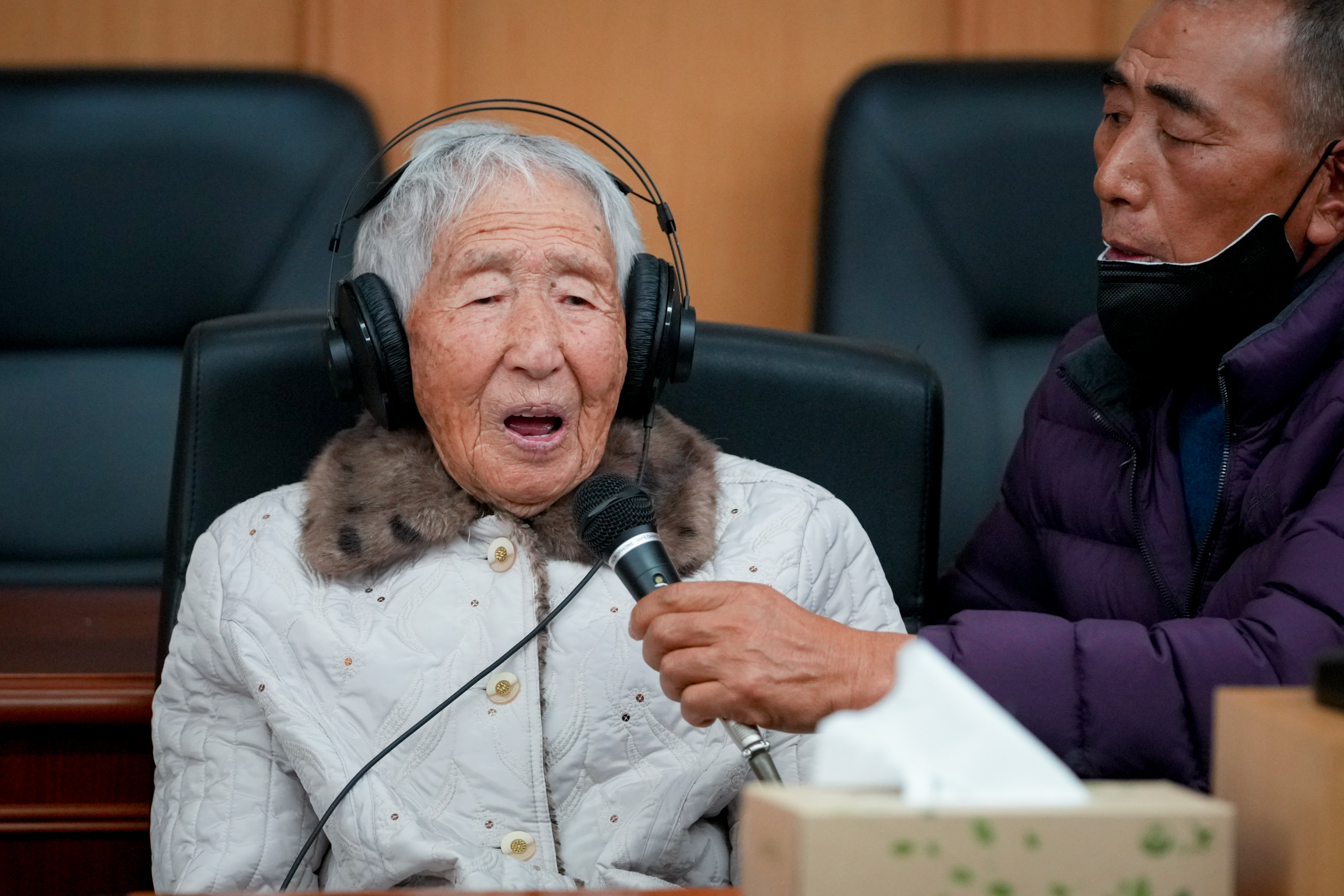National Compensation? Reparation? Start with ‘criminal compensation’
News Focus II
National Compensation? Reparation?
Start with ‘criminal compensation’
Ruling for exoneration of victims is the new beginning, not the end
Obtain the written final judgment from the defense counsel in the retrial
Lee Dong-gun
Reporter, The Jeju Sori
 ++ A retrial is held for surviving Jeju 4·3 victims of unlawful conviction at the Jeju District Court. (Photo provided by Jeju Special Self-Governing Province)
++ A retrial is held for surviving Jeju 4·3 victims of unlawful conviction at the Jeju District Court. (Photo provided by Jeju Special Self-Governing Province)
The number of those Jeju 4·3 victims who served jail terms due to the unlawful first and second courts-martial reaches 2,530. The List of Convicts contains the names of all those 2,530 people who were convicted of crimes of insurrection or violation of the National Defense Guard Act that was formerly in effect. An estimated 1,800 more victims were also put to general trials and ordered to be imprisoned for violating the National Security Act. Retrials begin when it is admitted that the previous court ruling was unlawful. That is, the court decides to reexamine cases where the prosecution requested the punishment of an innocent person and brought in a guilty verdict.
Retrial to free the victims from disgrace is the new beginning, not the end
With the enforcement of the revised Special Act on Discovering the Truth of Jeju 4·3 and Restoring Honor to the Victims (Jeju 4·3 Special Act), retrials have been introduced to vindicate the honor of those who suffered the false charge of being ‘reds’ during Jeju 4·3. Special retrials and ex officio retrials began in 2022, acquitting some 500 defendants and eventually freeing them from the unlawful convictions that had remained in place for more than seven decades. The retrials, which were institutionalized exclusively for the cases related to Jeju 4·3, have led to a swift exoneration process for the victims who suffered the tormenting disgrace for so many long years.
Requesting the acquittal of the victims, the prosecutor present at the court is about to cry. The defense counsel, who also finds it difficult to control his emotions, pleads for the innocence of the victims. When the judge finally announces that each victim is not guilty, the originally silent courtroom is imbued with tears of joy and applause.
This cheering for the acquittal should not be the end. Efforts are needed to make up for the 70-plus years of guilt by association where the victims were harassed as the ‘reds’ and their descendants as the ‘children of reds’. Even an acquittal does not bring back the deceased, nor does it erase the memories of so much torture. Not to mention that it cannot suddenly cure the pain or enable the victims to recuperate their strength.
National compensation? Reparation? Criminal compensation?
Different procedures are required to apply for national compensation, reparation, or criminal compensation.
The South Korean government recently began paying the national compensation to the victims of Jeju 4·3. On the basis of the nation’s disability grading scheme, up to 90 million won will be designated to compensate for damages. Problems may arise due to the diversity of personal cases, given the enormous number of victims. The government plans to make an en bloc payment by categorizing the damages into certain brackets. To claim eligibility for reparations, a civil suit needs to be brought to court. Some of the Jeju 4·3 victims filed lawsuits against the state to receive reparations, yet the expected results have not been entirely positive. This is because the court admits that the state must pay reparations to the victims and their families but only when it is made in a lump-sum payment. The amount of reparations is to be 100 million won for a victim, 50 million won for a victim’s spouse, and 10 million won for a victim’s child. Criminal compensation is the remaining option, which compensates the convicts for the period of their unlawful prison terms.
For example, if a victim of Jeju 4·3 who has already received 90 million won for national compensation wins the lawsuit for reparation worth 100 million won, the court will entitle the victim to reparation of only 10 million won. This means the amount already paid is deducted from the eligible reparation.
Of the three measures, criminal compensation would provide the highest compensation. This is why investigation for this report reached the conclusion that the eligible victims and families would consider criminal compensation to be more important than national compensation or reparation.

What is “criminal compensation”?
Criminal compensation is the measure that is employed when the state needs to compensate for detention or damage caused to innocent victims because of injustice. In the case of criminal compensation for Jeju 4·3, the amount of individual payment would vary, unlike national compensation that is to be paid en bloc or and reparations that are deemed to be paid as such.
In accordance with the Act on Criminal Compensation and Restoration of Impaired Reputation (Criminal Compensation Act), the amount of compensation is calculated at a daily rate by apportioning according to the period of detention; it shall be no less than the minimum daily wage and can be up to five times the minimum daily wage. Criminal compensation has already been claimed and paid to victims of Jeju 4·3. The panel of judges established good precedent wherein the period of detention and the criteria for the payment of compensation were applied most favorably to Jeju 4·3 victims.
As of 2022, South Korea’s minimum hourly wage is 9,160 won. If a daily work schedule of eight hours is assumed, the daily wage will be 73,280 won. With a multiple of five applied following the precedent, the amount of the final compensation will likely be 366,400 won per day. In the case of a victim who served one year in prison under false charges during Jeju 4·3, he or she can claim criminal compensation for up to 133,736,000 won (366,400 won × 365 days).
Victims may file a suit themselves, but one may also appoint a lawyer for legal aid and an easier process. When hiring a lawyer, it is necessary to check in advance what will be the final amount of criminal compensation after deducting the legal fees. It is not recommended to keep waiting until the minimum wage rises. According to Article 8 “Period of Claiming Criminal Compensation” of the Criminal Compensation Act, each claim for compensation has to be filed within three years from the date of becoming aware of a verdict of innocence and within five years from the time such a verdict is finalized. This means that when the given term expires, the victim will become ineligible for the claim. Therefore, an eligible victim is advised to consult with a lawyer for criminal compensation after obtaining the written final judgement from his or her defense counsel in charge of the retrial.

Discuss with family members and determine the applicants first
The claim needs to be filed by an eligible applicant, that is, a victim of unlawful imprisonment during Jeju 4·3. As more than 70 years have passed, there remain only a small number of victims who can claim compensation. In the case where the victim died, his or her family inherits the eligibility for application of compensation.
Let’s take an example of a deceased person, here labelled Victim A, who served a jail term under false charges during Jeju 4·3. Victim A had two children, Child B and Child C. Child B, who also passed on, was survived by three children, while Child C is still living, with two children of his own. Child C applied for a retrial for his innocent father, and Victim A has been acquitted. In accordance with applicable laws, not only Child C and his two children but also Child B’s three children are eligible applicants for the payment of Victim A’s criminal compensation. Due to the passing of 70-plus years, eligibility may apply to several generations. This often leads to cases where an unforeseen applicant for compensation payment is identified, although there exist other family members who have steadily performed the ancestral rites for their loved one.
To address the issue, a victim’s family members who are eligible for criminal compensation first need to recognize one another and discuss who will file a claim. Applying for criminal compensation without prior discussion in the family may delay the payment when other eligible applicants raise objections. If an argument takes place among family members, no one can guarantee when the case will end, especially due to the possible legal disputes filed against each other. The movement to discover the truth of Jeju 4·3 and restore honor of the victims has valued reconciliation and mutual prosperity. The last thing that should occur should be disputes over the eligibility for compensation among victims’ family members who have practiced the virtue of generosity and embodied the values of reconciliation and mutual prosperity.
With the growing impetus for the vindication of Jeju 4·3 victims, the bereaved families need to “strike while the iron is hot,” spurring their efforts for compensation payment. Resolving Jeju 4·3 is still underway and many have yet to be identified as victims. The longer it takes for the families of exonerated victims to move on to the next step, the more delayed the compensation for unidentified victims will become. The court decisions on criminal compensation has already slowed down due to the recent rise in the number of applicants. With no additional staff employed, the court struggles to address the worsening heavy workload.
In case where an eligible applicant lives in Japan or elsewhere in the world, it will take months just to exchange and confirm the necessary documents. As the documents should be delivered through the Ministry of Foreign Affairs, not by regular post, it is unimaginable how many years will be needed if the documents are returned with the addressee unknown. Therefore, it is essential that families of Jeju 4·3 victims or other related associations actively contact those victims and their families residing overseas that are eligible for the payment of national compensation, criminal compensation, and reparation.
 ++ Park Hwa-choon (aged 95) is acquitted by the court on Dec. 6, 2022 after the retrial for her imprisonment 74 years ago due to the brutal torture by constabulary forces and the subsequent unlawful court-martial. (Photo provided by Jeju Special Self-Governing Province)
++ Park Hwa-choon (aged 95) is acquitted by the court on Dec. 6, 2022 after the retrial for her imprisonment 74 years ago due to the brutal torture by constabulary forces and the subsequent unlawful court-martial. (Photo provided by Jeju Special Self-Governing Province)